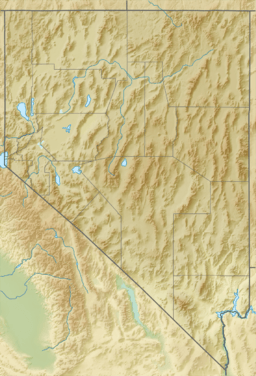Alkali Lake (Lander and Pershing counties, Nevada) facts for kids
Quick facts for kids Alkali Lake |
|
|---|---|
| Location | Lander County, Nevada and Pershing County, Nevada |
| Coordinates | 40°24′58″N 117°19′13″W / 40.41611°N 117.32028°W |
| Type | Lake |
| Surface elevation | 4,603 feet (1,403 m) |
Alkali Lake is a unique lake located in the U.S. state of Nevada. It is found in both Lander County, Nevada and Pershing County, Nevada. This lake gets its name because it is a special type of water body known as a "soda lake" or "alkaline lake."
Contents
What Makes Alkali Lake Special?
Alkali Lake is called an "alkaline lake" because its water has a very high level of alkalinity. This means the water contains a lot of dissolved salts, especially those that make it basic, like baking soda.
How Do Alkaline Lakes Form?
Alkaline lakes often form in dry areas where water flows into a basin but has no way to flow out. As the water evaporates, the salts and minerals it carries are left behind. Over long periods, these minerals build up, making the water very salty and alkaline.
Why Is the Water So Basic?
The water in Alkali Lake is basic because of the types of minerals dissolved in it. These minerals, like sodium carbonate, make the water have a high pH. A high pH means the water is more alkaline, similar to how soap or baking soda feels.
Life in Alkaline Lakes
Even though the water is very salty and alkaline, some special types of life can still thrive in Alkali Lake. These include certain kinds of algae, bacteria, and tiny invertebrate animals. These organisms have adapted to live in such extreme conditions.
Unique Organisms
The organisms that live in alkaline lakes are often called extremophiles. They have special ways to deal with the high salt content and pH levels. For example, some bacteria can use the minerals in the water for energy.
Location and Environment
Alkali Lake is situated in a desert environment in Nevada. The surrounding landscape is typically dry and rugged. The lake's elevation is about 4,603 feet (1,403 meters) above sea level.
Climate Around the Lake
The climate in this part of Nevada is generally arid, meaning it's very dry. There is little rainfall, and temperatures can vary greatly between day and night, and between seasons. This dry climate contributes to the lake's high evaporation rate.
Impact of Evaporation
Because of the dry climate, a lot of water from Alkali Lake evaporates into the air. This evaporation leaves behind even more salts and minerals, which keeps the lake highly alkaline. It's a continuous process that maintains the lake's unique chemistry.
Importance of Alkaline Lakes
Alkaline lakes like Alkali Lake are important for several reasons. They are natural laboratories for scientists to study how life can survive in extreme environments. They also play a role in the local ecosystem.
Scientific Research
Scientists study alkaline lakes to understand how minerals cycle through the environment. They also learn about the unique organisms that live there. This research can help us understand how life might exist on other planets with harsh conditions.
Ecological Role
Even in a seemingly harsh environment, Alkali Lake supports a unique food web. The algae and bacteria form the base of this web, providing food for the small invertebrates. These, in turn, might be a food source for birds or other animals that visit the lake.



